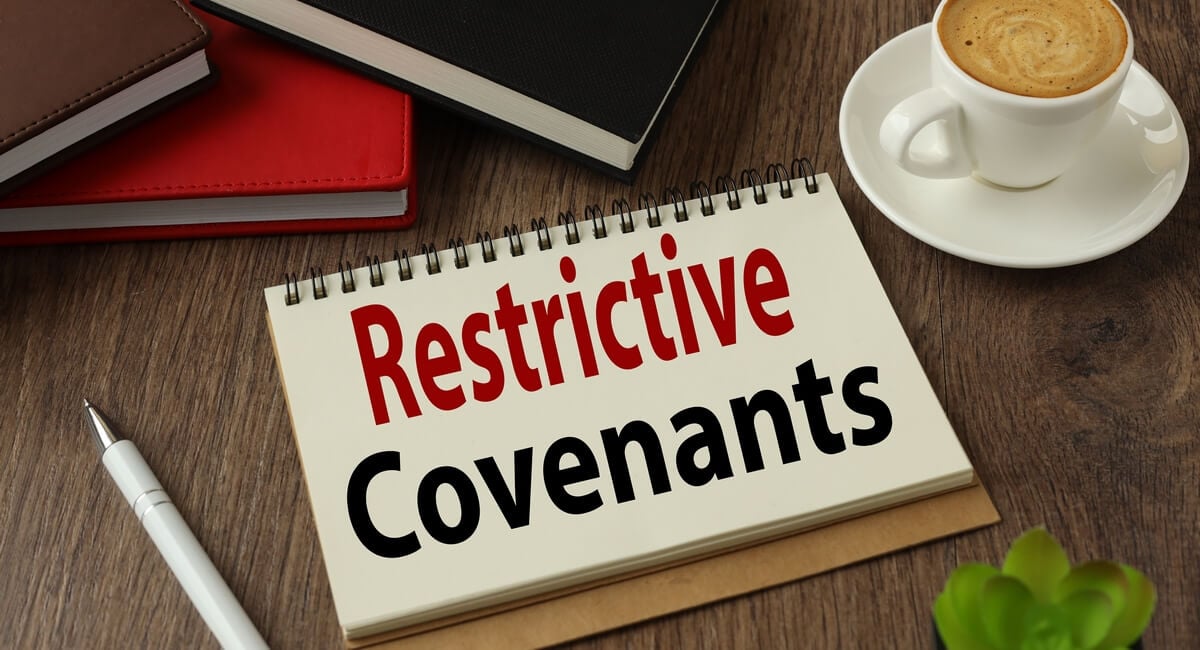When purchasing property in certain Canadian communities, you may be required to adhere to specific rules and regulations. These are commonly referred to as restrictive covenants, condominium bylaws, and community rules, and they can significantly impact your experience as a homeowner. If you are considering buying residential or commercial property in a community with these restrictions, it is essential to understand what they are, how they function, and how they can affect your property ownership.
What Are Restrictive Covenants and Community Rules?
Restrictive covenants are legally binding conditions registered on a property’s title that dictate how the property can be used. These are often put in place by developers or property management groups to maintain uniformity and property values within a neighbourhood. Additionally, condominium corporations and residents’ associations may establish bylaws and rules that govern property maintenance, renovations, and permitted activities.
In Canada, these restrictions are typically enforced by Condominium Boards (in condo developments) or Residents’ Associations (in private communities). Unlike in the U.S., where Homeowners’ Associations (HOAs) play a dominant role, Canadian municipalities handle many services that HOAs would otherwise manage.
Examples of Common Restrictions in Canadian Communities
Restrictive covenants and community rules vary widely depending on the neighbourhood and the type of property. Below are some of the most common types of regulations found in Canada:

Pet Restrictions
Certain condominium corporations and planned communities impose restrictions on the number, size, or breed of pets that residents can own. Some bylaws may limit the number of dogs or prohibit exotic pets like chickens or reptiles.
Landscaping and Maintenance Requirements
To maintain curb appeal and property values, some communities enforce strict landscaping standards. Homeowners may be required to keep their lawns mowed, trim hedges, and seek approval before making significant landscaping changes. Seasonal decoration rules and bans on unsightly clutter are also common.

Exterior Appearance Regulations
Some restrictive covenants dictate acceptable exterior paint colours, roofing materials, or fence styles. These rules are more common in newer developments where developers want to maintain a cohesive aesthetic.
Additional Structures
If you wish to build a shed, deck, or fence, you may need approval from the condominium board or residents’ association. Some restrictions limit the size and type of structures allowed.
Short-Term and Long-Term Rentals
Many condominium corporations and some planned communities in Canada restrict short-term rentals (such as Airbnb) and long-term leasing. Some developments prohibit rentals entirely, while others allow only long-term tenants who meet specific conditions.
Home-Based Businesses
While having a home office is generally permitted, bylaws may restrict businesses that bring additional traffic into the neighbourhood, such as daycares, hair salons, or auto repair shops.
Parking and Vehicle Restrictions
Some communities regulate where residents can park their vehicles, the number of vehicles allowed, and whether commercial vehicles, RVs, or boats can be stored on driveways.

Legal Considerations and Human Rights
Under Canadian human rights legislation, restrictive covenants and community rules cannot discriminate based on race, gender, religion, disability, or other protected grounds. If you suspect that a rule is being used to exclude certain groups, you may have legal recourse through the Canadian Human Rights Tribunal or provincial human rights commissions.
Penalties for Violating Restrictive Covenants and Community Rules
The enforcement of these rules is typically outlined in the community’s bylaws. In most cases, homeowners will receive a warning and be given time to correct the violation. If they fail to comply, potential penalties may include:
- Fines or additional fees imposed by the condominium board or residents’ association
- Legal action if violations persist
- Forced compliance measures, such as hiring contractors to rectify an issue at the homeowner’s expense
- In extreme cases, liens against the property, which can lead to legal proceedings
Some communities allow homeowners to apply for exemptions under special circumstances, such as an unexpected relocation or family emergency.

Benefits of Living in a Community With Restrictive Covenants
Despite the restrictions, there are several advantages to living in a community with well-defined rules:
Preserves Property Value
These rules help maintain property values by ensuring that homes and common areas are well-kept, preventing individual homeowners from making changes that could negatively impact the neighbourhood’s appeal.
Enhances Neighbourhood Harmony
By enforcing noise limits, parking rules, and property maintenance, restrictive covenants help create a peaceful and orderly community while reducing disputes between neighbours.
Maintains Community Aesthetics
For those who value a well-maintained, uniform streetscape, these rules ensure that homes adhere to high standards, preventing unsightly alterations or neglected properties.

Drawbacks of Living in a Community With Restrictive Covenants
Before purchasing property in a community with restrictive covenants, consider potential downsides:
Limited Homeowner Freedoms
If you prefer complete control over your property, these rules may feel restrictive, especially regarding renovations, landscaping, or rental opportunities.
Restrictions on Real Estate Investment
For real estate investors, restrictions on short-term rentals or home-based businesses may limit income opportunities.
Mandatory Fees and Dues
Most communities with restrictive covenants require monthly or annual fees to cover amenities such as snow removal, landscaping, and common area maintenance. Some homeowners find these fees beneficial, while others see them as an added expense.
Final Thoughts: Is a Restricted Community Right for You?
Before purchasing a home in a community with restrictive covenants, carefully review the registered restrictions and bylaws to determine if they align with your lifestyle and property goals. While these rules can provide benefits such as enhanced property values and community aesthetics, they can also impose significant limitations. Consulting with a real estate professional or real estate lawyer can help ensure you fully understand the implications before making your decision.

